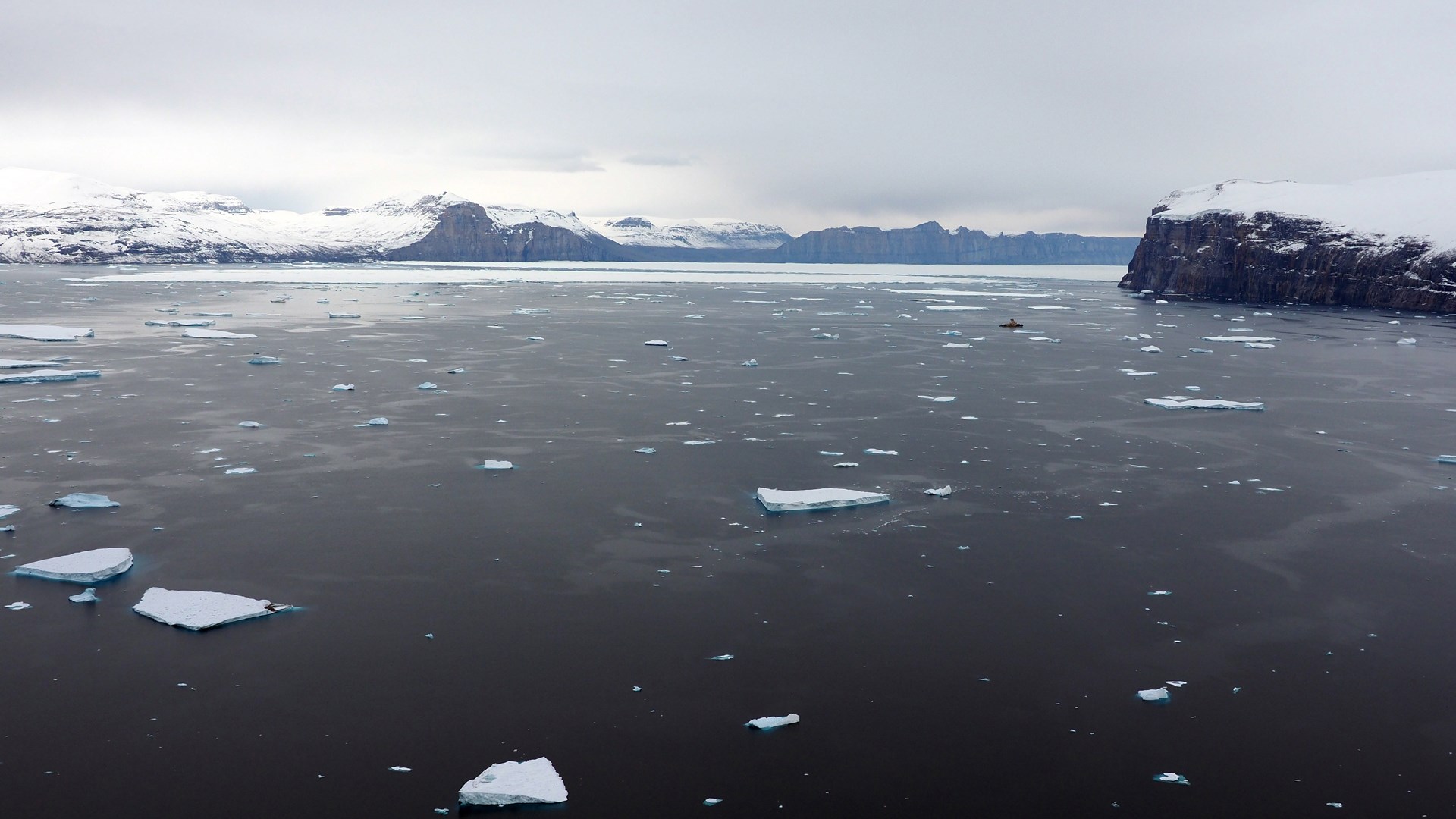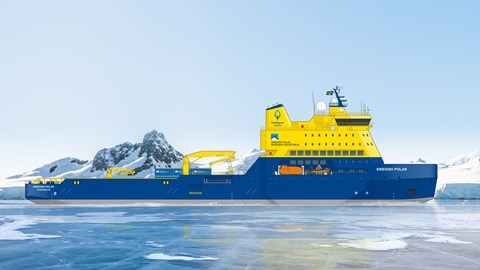The government is investigating possibilities for new polar research vessel
 The icebreaker Oden during the Ryder 2019 expedition. Photo: Martin Jakobsson.
The icebreaker Oden during the Ryder 2019 expedition. Photo: Martin Jakobsson.
A new investigation will look at what measures and collaborations are needed for Sweden to acquire and operate a modern climate-neutral polar research vessel.
Sweden's ambition is to be a world-leading polar research nation that can conduct expeditions year-round. In a press release, the Government announces, through Education Minister Mats Persson, that the next step is being taken to give Swedish polar researchers access to a modern climate-neutral research vessel. He also mentions that Sweden has a long history and a leading position in polar research that contributes data to global climate models.
The press release demonstrates that Sweden aims to maintain and develop the ability to navigate and collect data from the polar regions. This is important given the rapid climate changes in the polar regions and the effects these changes have on the climate and ecosystems. To understand and meet these changes, more data from ship-based observations is needed, among other things.
– It is very positive that the Government, with the investigation, is now taking the next step for Sweden's future modern polar research vessel to become a reality. The acquisition of a climate-neutral research vessel is a priority for the Swedish Polar Research Secretariat and a prerequisite for Sweden to maintain its leading position in marine polar research. Research in the polar regions is becoming increasingly crucial for understanding climate change and its consequences, says Katarina Gårdfeldt, General-Director.
Press release (in Swedish)
Background
Sweden's strategy for the Arctic region (2020/21:7)
On 24 September 2020, the government submitted Sweden's strategy for the Arctic region to the Riksdag. Polar research and environmental monitoring are one of six priority areas in the strategy, which states, among other things, that Sweden wants to be a world-leading polar research nation with the capacity for expeditions on a year-round basis. The strategy also mentions that the Polar Research Secretariat needs to continue to consider possible alternatives for access to a heavy polar-class, climate-neutral research vessel for year-round operations, even when the Swedish icebreaker Oden is no longer deemed to be able to be used for research missions.
> Sweden's strategy for the Arctic region (in Swedish)
Strengthened focus on future research infrastructure (SOU 2021:65)
In the investigation, among other things, the issue of different financing models for continued access to a research icebreaker is addressed. Some of the conclusions drawn were:
- A new polar research vessel should be seen as an investment for society
- New construction of a polar research vessel requires an increase in the ambition of polar research
- Renting space on a vessel or renting a vessel is likely cheaper than new construction but makes it more difficult for Swedish polar researchers
- Of the investigation's consultation responses, 17 responded to the issue regarding access to a polar research vessel, 15 of these were positive.
> Strengthened focus on future research infrastructure (in Swedish)
Polar Connect
The Swedish Polar Research Secretariat contributes to several projects within the Polar Connect initiative, which aims to lay a fiber optic cable via the Arctic on the seabed between Europe and Asia. Currently, no Western ship has the icebreaking capacity needed for cable laying. On the other hand, the new polar research vessel would live up to the requirements set for the mission. Polar Connect is led by NORDUnet.
> "EU funding for the Swedish project Polar Connect", the Swedish Research Council, 12 Janaury 2024
Benefits for the society
International relations
The new research icebreaker would strengthen Sweden's presence and influence in the Arctic and Antarctic. It would also benefit Science Diplomacy, i.e., promote international relations development. Today, Sweden is an attractive international partner in polar research, something that would be further strengthened with the new ship.
Favors green transition
A decision on climate-neutral research icebreakers sends positive signals to the industry. This could lead to the knowledge of methanol as a ship fuel being able to be further scaled up. In turn, this would benefit the green transformation of the ship fleet both nationally and globally, with reduced climate impact as a result.
Creates jobs
The social investment that a new research icebreaker implies leads to more jobs with suppliers and subcontractors. It will also provide more jobs in shipping and personnel in support functions such as research engineers, technicians and plumbers.
Stronger education
The new research icebreaker could become an essential mission for Scandinavian design, where aesthetics and functionality are combined. Even the Secretariat's valued teacher program, where teachers accompany on expeditions and bring valuable experiences to the students, could be scaled up further.
Art and culture
Just as we are a leading nation in polar research, we can continue to belong to the top tier in cultural contexts. The Secretariat's artist program contributes an important narrative that reaches a large audience. It also strengthens Sweden's cultural identity as a nation with strong ties to the Arctic.
Partner in important projects
For example, a new research icebreaker could play an important role in the Polar Connect project with the objective of laying a fiber optic cable on the seabed between Europe and Asia via the Arctic. Currently, no Western ship has the icebreaking capacity needed for cable laying.
Role in total defence
During the design work, the new research vessel could be adapted for tasks within total defence. In crisis and war situations, a heavy polar-class icebreaker can contribute capabilities in the polar regions currently lacking in total defence. Examples of missions include rescue operations or breaking ice for other ships or convoys.
Concept illustration
Advantages of the new polar research vessel
- Optimized for research
- Year-round use, thus available for research in both poles during all seasons of the year
- Climate-neutral operation
- Powerful propulsion and high ice class (PC2+) enable ice breaking in difficult ice conditions
- Modular design, can be adapted for different tasks
- Adapted for transport and various operations in open water (DP-2)
- Will strengthen international research collaborations
About Swedish marine polar research
- The Swedish-led expedition in 1980 with the icebreaker Ymer around Svalbard was the starting point for modern marine research in the Arctic.
- The icebreaker Oden has been used for polar research since 1991 and was the first research icebreaker to reach the North Pole in the same year together with the German research vessel Polarstern. Since then, Oden has returned to the North Pole ten times
- During 1991 – 2023, Oden completed 24 expeditions to the Arctic and five to Antarctica.
- She is one of the few research icebreakers that can handle the areas of difficult-to-access multi-year ice found in the High Arctic and around Antarctica.
- Swedish research has had great international success with the icebreaker Oden as a research platform. Many expeditions are carried out as collaborations with different nations or organizations, which increases the researchers' contact areas and collaboration opportunities. For example, joint research expeditions have been carried out with the USA, Canada and Germany.
- For example, Oden was part of the Arctic Coring Expedition (ACEX) 2004, Integrated Ocean Drilling Program (IODP). Articles from the expedition, in which Swedish researchers participated, have generated more than 8,600 citations (January 2020).
- Sweden has world-leading competence in ice breaking and "Ice Management" when it comes to carrying out advanced missions in the Arctic and Antarctic.
- Between 2005 and 2011, Oden worked in Antarctica in a Swedish-American research collaboration. Then, Oden developed a significantly more efficient method for breaking the ice lane to the US research station McMurdo.
- Oden's expedition activities have significantly contributed to the understanding we now have of the development of the globe and the variation of the climate throughout history.

